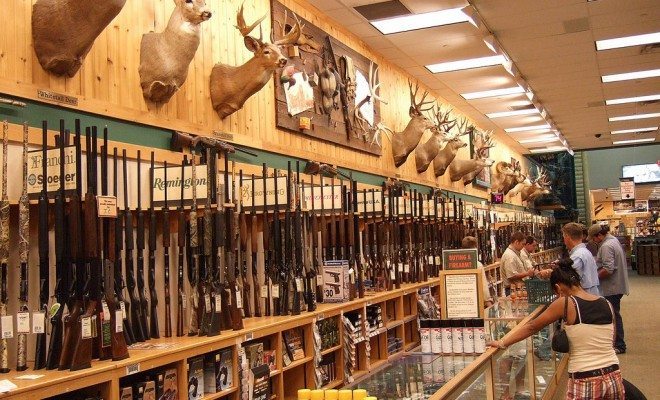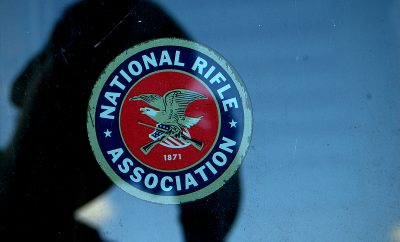
News
We Need to Stop Accepting Gun Violence
A man armed with a shotgun opened fire in an academic building at Seattle Pacific University on June 6, 2014. He walked up to three students and fired. One died; two were wounded. The following Friday, a man launched an assault against a courthouse in Forsyth County, Georgia. Only one person was wounded, but given the assailant’s stockpile of ammunition and bombs, it’s safe to assume he had much bigger plans. While the nation had a day off from similar violence that Saturday, Sunday was met with another shooting in Las Vegas. A couple killed two cops and a civilian before turning their guns on themselves. Last Tuesday, June 10, there was a school shooting in Oregon. Two are confirmed dead from that incident. That’s four shootings in six days with seven people dead.
Gun Rights and the Constitution
Americans have long viewed the freedom to own a gun as a point of pride, one that is staunchly protected by the National Rifle Association, possibly the most successful lobbying group in modern American history. The NRA has shaped the way Americans currently view the Second Amendment.
But let’s look at what the Second Amendment really says. It reads: “A well regulated Militia, being necessary to the security of a free State, the right of the people to keep and bear arms, shall not be infringed.”
To be fair, the comma placement makes this a difficult sentence to interpret. But the historical purpose of this amendment came from states’ concerns that there would be a federal militia but no state militias. This amendment was created to protect a state’s right to form its own militia. But in recent years, the NRA has expertly convoluted the Second Amendment into the meaning it holds today — the absolute right to own a gun. It claims any gun control endeavor is a staunch violation of individual freedoms.
Now, I am not going to suggest banning individual ownership of guns in America. Not only is that a probable constitutional violation, the public would never allow that to happen. But I do not see any reason why restrictions cannot be placed on gun ownership. The constitution is not absolute. For example, the First Amendment says Congress can make no law abridging a person’s freedom of speech. Reading this as an absolutist, the amendment can be interpreted as allowing any person to say anything he wants. But both individual states and Congress have passed laws limiting speech, such as a law declaring it unlawful to use free speech to incite violence or intimidate. According to that law, the Ku Klux Klan cannot burn a cross to intimidate an individual. If the First Amendment was interpreted as absolute, this law would not have been possible.
There is no reason the Second Amendment should be treated as an absolute when the First is not. The government can restrict speech to protect its citizens, so it should also be able to restrict gun sales to do the same. But when it comes to the Second Amendment, the NRA and the most vocal gun advocates deal in absolutes. David Metcalf, an avid gun user, former editor of Guns & Ammo and member of the NRA, recently made a similar argument to the one I just made. He was called a traitor and threatened just because he argued that regulating guns isn’t an automatic infringement on gun owners’ rights.
Gun Rights and Crime
Now, regardless of the constitutionality argument, the NRA claims that regulation of guns will do nothing to stop crime. It argues that people need guns to protect themselves and that anyone can get a gun on the black market, so new restrictions will do nothing. But let’s look at some data. In 2012, Britain, a nation with strict gun laws, had a murder rate of 1.2 per 100,000, while America had a rate of 4.8 per 100,000. The gun murder rate for England and Wales is 0.1 per 100,000, while it is 3.2 per 100,000 in the United States. This isn’t an isolated example — the US has by far the highest per capita gun deaths among developed nations.
Several things could be done about this crisis. We could implement much stricter background checks and require gun licenses be subject to regular renewals. These changes need to be paired with better treatment and recognition of those who are mentally ill. We need to identify those who are at risk, and then prevent their access to guns. Furthermore, assault rifles, such as the AR-15, should not be legal. A variant of this weapon was used in the Sandy Hook shooting. The shooter stole the gun from his mother’s collection. If the gun was banned, even if it was still available on the black market, the Lanzas probably would not have purchased it illegally. Finally, there is a large black market for guns, so any legal restriction of gun use must be paired with money for the FBI and ATF to shut down it down.
I began this article by highlighting four shootings that took place in the span of six days. Many Americans have reacted by saying, “well, it could have been worse.” This is an attitude of acceptance, because those deaths simply didn’t have to happen. Gun regulation is constitutional and it has worked elsewhere. We owe it to the past and future victims of gun violence to give it a try.
—
Matt DeWilde (@matt_dewilde25) is a member of the American University class of 2016 majoring in politics and considering going to law school. He loves writing about politics, reading, watching Netflix, and long walks on the beach. Contact Matt at staff@LawStreetMedia.com.
Featured image courtesy of [Sean Savage via Flickr]








Comments